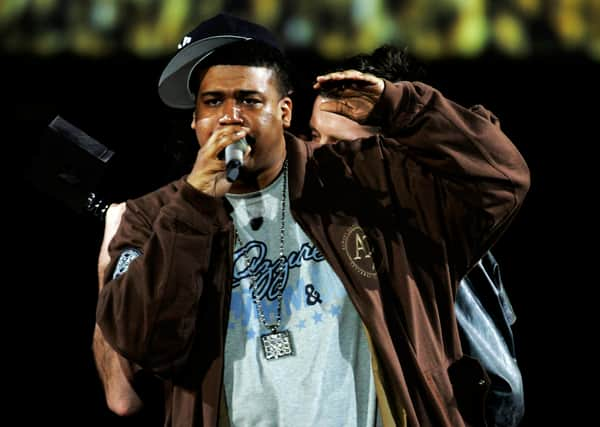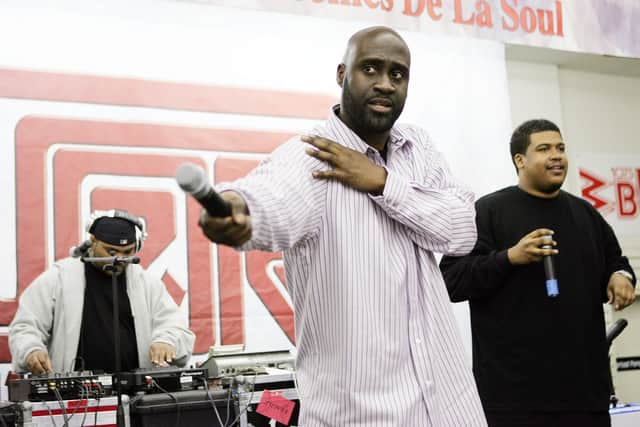The enduring legacy of De La Soul - as founder Trugoy The Dove dies aged 54
People in this article


The world of hip hop is in mourning today (Monday 13 February) with the news that De La Soul founder Trugoy The Dove, known to friends as David Jude Jolicoeur, died aged 54 this weekend. The cause of the iconic rapper’s death has not yet been disclosed as of writing, but Jolicoeur has spoken numerous times about his battle with a congenital heart condition that had led to problems with a De La Soul tour.
The importance of Jolicoeur and De La Soul on hip-hop, both at the time and in the future, cannot be understated. Even before his untimely death, the ‘90s hip-hop trio was considered an incredible influence on a different fork of the genre at a time where gangsta rap became the predominant subsect within hip-hop culture.
Advertisement
Hide AdAdvertisement
Hide AdThey were at one stage considered the 'hippies of hip-hop' in some journalism circles, while for hip-hop connoisseurs, their upbeat lyrics and antithesis of what was emanating from South Central or New York became an undeniable influence for future hip-hop artists including Drake, Common and The Weeknd.
So how did Trugoy and two childhood friends from Long Island, New York become so revered within music circles at a time when there was a lot of anger and frustration from the community? Also, how did the group’s refusal to have their music streamed and use of samples affect their standing with a new generation of hip-hop fans?
Conscious hip-hop movement of the ‘90s
Alongside high school friends Kelvin Mercer (Posdnuos) and DJ Vince Mason Jr. (Maseo), Trugoy formed De La Soul intending to incorporate jazz and 'offbeat' lyrics compared to some of their peers around the late ‘80s. Whereas N.W.A sought to reflect on their perspective as youths growing up in South Central amid racial tension and profiling from LAPD, De La Soul decided to take a different approach.
While still using their music to talk about social issues, the presentation was a more laid-back, jazz-inspired approach to storytelling rather than the blunt force trauma felt by Dr. Dre’s production and Ice Cube/Eazy-E’s aggressive rapping style. De La Soul chose to experiment with softer, warmer sounds - akin to fellow 'flower-pop-hop' group PM Dawn, who found instant success with their Spandau Ballet sampled Set Adrift on Memory Bliss.
Advertisement
Hide AdAdvertisement
Hide AdRather than be decked out in chains and black clothing, the band adopted a more colourful fashion palette, eschewing what many at that stage thought the 'hip hop' look was and with a more dulcet approach to their vocal takes throughout their work, were considered one of the forerunners to the later conscious hip-hop movement.
This movement, which included A Tribe Called Quest, Arrested Development and Del the Funky Homosapien to begin with, sought to challenge the dominant cultural, political, philosophical, and economic consensus, and comment on or focus on social issues and conflicts. It also had a profound influence on later artists such as Kendrick Lamar, Mos Def (who got his first start with De La Soul) and Talib Kweli, whom many music critics would refer to the subgenre now as 'progressive hip hop'.
Their debut album, 3 Feet High and Rising, was released in 1989 to overwhelming critical acclaim and commercial success and included landmark hip-hop tracks such as The Magic Number and Me, Myself and I. The US's National Recording Registry in 2010 for its significance and various hip-hop publications will frequently reference the album as one of the best rap albums ever released.
But like a poisoned chalice the success came with a price, and a cautionary tale for hip-hop artists going forwards.
Legal battles with The Turtles and royalty disputes
Advertisement
Hide AdAdvertisement
Hide AdBedroom producers may be familiar with the idea that you can sample something for a few seconds and not have to pay a songwriting royalty, which simply isn’t the case and led to a dispute between the Long Island trio and ‘60s pop group The Turtles.
The Los Angeles Times reported back in 1989 the legal troubles the hot new musical act faced, as the pop group accused De La Soul of 'unauthorised use' of the first four bars of the Turtles’ 1969 hit You Showed Me on De La Soul’s smash album. They contended that the introduction to the Turtles’ hit repeated several times in a tape loop; this formed the basis of 'Transmitting Live From Mars', a selection on the De La Soul album.
The issues regarding the early years of sampling in hip-hop led to De La Soul amending their contract with Native Tongues. To circumvent sampling problems again their music would only be released in a physical format. This would lead to a prolonged absence on streaming platforms with Warner Music refusing to release their work due to a reluctance to clear samples and renegotiate contracts.


It led Tommy Boy Music to purchase De La Soul’s back catalogue in 2017 and Trugoy to let the world know their music would finally be on digital platforms in 2019. However, a dispute in royalties (the band would only earn 10% of streaming revenue from their back catalogue) led many big names in hip-hop including Nas and Questlove to call for a boycott of the label.
Advertisement
Hide AdAdvertisement
Hide AdIt all culminated in 2021, when Reservoir Music picked up the back catalogue and, according to Talib Kweli, was returned to the trio to once again give them ownership of their music. The latest regarding De La Soul’s back catalogue is that it will see the digital light of day in March 2023.
A modest ‘90s and Gorillaz success
Despite their inclusion as a landmark hip-hop act and providing a watershed moment for the genre, the ‘90s were unkind to the group. Despite continued critical reviews, Trugoy and company saw their album sales diminish with each new release. However, with the new millennium, one of their most elusive acknowledgments was finally achieved, by virtue of one Blur lead singer Damon Albarn.
Gorillaz released Feel Good Inc in 2005, from their second album Demon Days, which featured Jolicouer and Mercer providing lead vocals during the verses of the track. Its commercial success finally saw De La Soul reach what many considered the apex of a musical career - a Grammy award in 2006 for Best Pop Collaboration with Vocals. The groups would collaborate once more with 2017’s track, Momentz.
Comment Guidelines
National World encourages reader discussion on our stories. User feedback, insights and back-and-forth exchanges add a rich layer of context to reporting. Please review our Community Guidelines before commenting.
